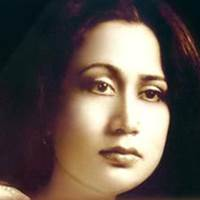ALL
Profile
Ghazal86
Nazm39
Sher110
E-book32
TOP 20 SHAYARI 20
Image Shayari28
Audio32
Video60
Qita1
Gallery 3
Blog1
Profile of Parveen Shakir
Pen Name : 'Parveen'
Real Name : Parveen Shakir
Born : 24 Nov 1952 | Karachi, Sindh
Died : 26 Dec 1994
LCCN :n79062265
maiñ sach kahūñgī magar phir bhī haar jā.ūñgī
vo jhuuT bolegā aur lā-javāb kar degā
main sach kahungi magar phir bhi haar jaungi
wo jhuT bolega aur la-jawab kar dega
Parvin Shakir was a poet of new and fresh expression who subtly emoted the feelings of women about men. Her poetry is neither the sighing and lamenting traditional poetry nor openly romantic poetry. The intensity of emotion and its simple yet artistic expression is the characteristic of Parveen Shakir's poetry. Her poetry is the manifestation of the struggle of union and separation, where neither of the two, reaches fruition. Parvin’s sincerity, exquisiteness, and purity of expression helped her achieve a distinguished position in women’s Urdu poetry. According to Gopi Chand Narang, the scenario of new poetry is incomplete without Parveen Shakir's sigil.
Commenting on Parvin Shakir's poetry, her mentor Ahmad Nadeem Qasmi said that Parveen's poetry was the spread of this couplet of Ghalib, ‘phuu.nkaa hai kis ne gosh-e-mohabbat me.n ai KHudaa, afsuun-e-intizaar tamannaa kahe.n jise’. He explains that the longing, that is the spell of waiting, taught from Homer to Ghalib, the best of poetry, to beat in the human heart, and Parvin Shakir with this spell made Urdu poetry bathe in the rainbow of true passion.
Among female poets, Parvin Shakir seems to give a new dimension to Urdu poetry due to her unique tone and expression of emotional and psychological issues of women. She uses a fearless and fierce idiom, and is seen boldly protesting against oppression and tyranny, and does not draw the veil of unnecessary modesty over her emotions and thoughts. Her motifs are limited, yet the reader finds in her poetry melody, the sincerity of the experiences, and a pleasant-sounding fresh expression.
Parvin Shakir was born in Karachi on November 24, 1952. Her original hometown was Lahiria Sarai in the Darbhanga district of Bihar. Her father, Shakir Hussain Saqib, who was also a poet, had settled in Karachi after the formation of Pakistan. She started writing poetry at an early age and was inspired by her father. Parveen passed her matriculation examination from Rizvia Girls School, Karachi and, BA from Sir Syed Girls College. In 1972, she studied English Literature in Karachi. Later, she earned an MA from the university, and then an M.A. in linguistics. After completing her education, she joined Abdullah Girls College, Karachi as a teacher. In 1976, she married her cousin Naseer Ali, a doctor in the military. Naseer was Parvin’s choice but sadly the marriage ended with divorce. She has one son from Dr. Naseer. After teaching in the college for 9 years, Parveen passed the Pakistan Civil Service Examination and was appointed Second Secretary Central Board of Revenue in 1982. Later she served as Deputy Collector in Islamabad. At the tender age of 25, her first collection of works, "Khushbuu", came to the fore and caused a stir in literary circles. She was awarded the Adam G Award for this collection.
Parvin’s personality was full of self-confidence which is also reflected in her poetry. Due to this, she faced all kinds of difficulties in her life. Within a span of 18 years, four of her poetry collections namely, ‘Khushbuu’, ‘Sad-Rang’, ‘Khud-Kalami’, and ‘Inkar’ came to light. In 1994, her last collection ‘Maah-e-Tamaam’ was published. In 1985, she received the Dr. Muhammad Iqbal Award and in 1986, the USIS Award. She was also awarded the Faiz Ahmed Faiz International Award and the country's prestigious award, the Pride of Performance. She passed away in a car accident on 26th December 1994.
Her first collection of poems, ‘Khushbuu’, describes the romance and emotions of a teenage girl, in which she explores her personal life experiences in deep thought and broad imagination, revealing the state of the heart of a woman in love. Time and again, in her poetry, it seems as if she not only wants to be loved but also wants her lover to express it in words. Parvin’s poetry is an interlude to a girl entering adulthood, and the tale-bearer of a woman fettered in the knot of marriage. Her couplets attempt to convey a message of awakening to the new generation, challenging the misconception of marriage and the man's monopoly on women. Neither did she write poetry which repeated the same emotions over and over again nor did she submit to the age-old oriental modesty that a woman has to abide by. She excluded transcendence from poetry and encouraged Urdu women's poetry to speak in its own way.
USEFUL LINKS : | http://razarumi.com/remembering-parveen-shakir-1952-1994/
Tagged Under
Authority Control :The Library of Congress Control Number (LCCN) : n79062265

